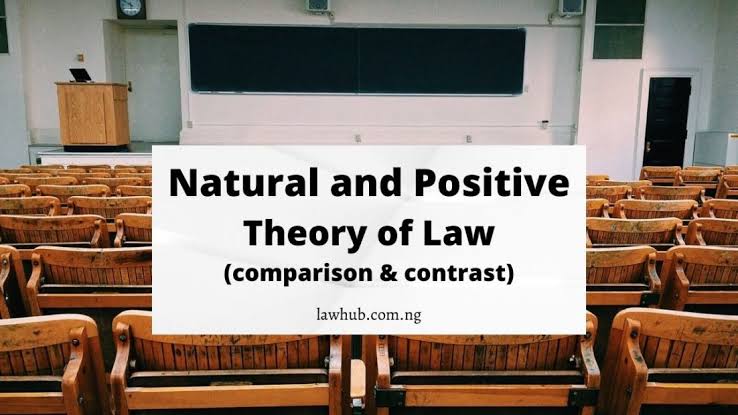Comparison and Contrast of Natural and Positive Theory of Law
These two are most likely the most popular of the theories of Law.
Perhaps, because they are simple and easy to understand.
Nevertheless, they can also be confusing or hard to get.
So, it is important that we know the similarities and differences between the two.
See also: Law meaning
This post is about the similarities and differences between Legal Positivism and Natural Theory of Law.
Differences Between Positive Law Theory and Natural Theory of Law
According to Heinrich A. Rommen, “Every generation, it is said, finds now reason for the study of Natural law.”
This assertion underscores enduring nature of the running battle between natural law and positive law.
Over the years, there has been an undeniable argument. This is among the protagonists of natural law, and those of positive law.
This argument has been based on the answer to a question. “What should determine the validity of a law?”
Should a law be valid because it is moral. Or because it is enacted by a body of persons (legislators) – promulgated and empowered to make such law?
A balance point can be met in the effort of giving these two theories detailed and valid explanation.
But, so many facts have shown that they contrast beyond any reasonable doubt.
And in order to get a good grasp of the differences of these two legal conceptions, a clear understanding of what they mean must be acquired.
Positive Law Theory: Legal Positivism
A law, in accordance to Positive Law, is the rule put, placed, or imposed upon the situations by the ruler.
According to John Austin, who appears to be one of the most prominent protagonists of the Positive Law Theory, in his book titled, ‘The Providence of Jurisprudence Determined,’ he defined law as, “a command set by a superior being to inferior beings and enforced by sanction.”
This definition is based upon his propounded ‘Command Theory of Law.’
According to him, the superior being is sovereign. We may describe the sovereign being as ‘The Uncommanded-Commander.” So, according to positive law, a law is valid because a person or body we empower to do so sanctions it. And such law is binding on all members of the society or state.
Natural Theory of Law
On the other hand, the Natural Theory of Law is a philosophical and legal belief that all humans govern themselves by basic innate laws. Or laws of nature. Which are separate and distinct from the legislated laws. This theory is somewhat an opposite of the positive law theory.
The Chief protagonists of this legal theory include Thomas Aquinas, Zeno, Socrates, Plato, Grotius, Aristotle, etc. It is difficult to give a precise concept of the theory of Natural law, because of the so many theoretical views attached to it.
However, the basic moral principles are unchanging, and they include the following. The idea that basic moral principles validate the law, the existence of Natural rights, and the ideology that just law(s) bind in conscience.
This theory, Natural Law, runs on the idea of perfect law based on equity, fairness, and reason. By which we can measure all man-made laws. And to which they must (as closely as possible) conform.
That is to say, according to Natural Law, any positive law must conform to the innate principles of man.
Differences between Legal Positivism and Natural Theory of Law
Here are some of the differences between the Positive and Natural theory of law.
1. The determination of validity of laws:
While the Positive Law states that a law is valid if a body that we empower to do so makes it. And binding on the subject.
The Natural Law Theory clearly states that a law is valid if and only if it conforms to the innate principles of man.
In the case of Holman V Johnson, the plaintiff sold tea to the defendant in Dunkirk_ France, with the full knowledge that the tea was to be smuggled into England.
According to the dictates of Positive Law Theory, the contract in the scenario above is legal, because in the principles of International law, ‘no country ever takes notice of the revenue laws of another country.’
See also: Meaning of Prayer in Law: Motion and Summon
However, when we subject it to the critical analysis of natural law, this contract is unfair, false, unjust, and should be held null and void.
2. Moral Principles
Natural law is typically based on moral principles, natural order, and ethical codes that people share as human beings. While we expect people to follow positive law as legal rules.
3. Good Reasoning
Natural law is, to a very great extent, based on good reasoning. While Positive law is based on enforced rules, which people follow enforce-fully.
See also: Pure Theory of Law
4. Multiple Conscience Problem
Also, Natural Law theory is subject to the problems of multiple consciences. This is almost impossible with positive law, where laws are relatively constant and definite.
5. While the Natural Law Stresses what we should do, rather than what we do. Positive law stresses what we do, and not what we should do.
Conclusion: Differences between Legal Positivism and Natural Theory of Law
It is noteworthy at this point that in spite of the running battle for supremacy, experience has shown that both the Natural Law and Positive law can co-exist within the same framework.
REFRENCES
1. Natural Law Vs Positive Law (comparison of contents and functions) by 130601052; web.
2. Introduction to Nigerian Legal Method, edited by Abiola Sanni.
3. Web; bartleby.cm-the difference between Natural Law and Legal Positivism Essay.
4. study.com/academy/lesson/natural-law-theory-definition-ethics-examples.html
5. philosophy.hku.hk/courses/law/Positive%20Law%20hnd.html


Leave a Reply